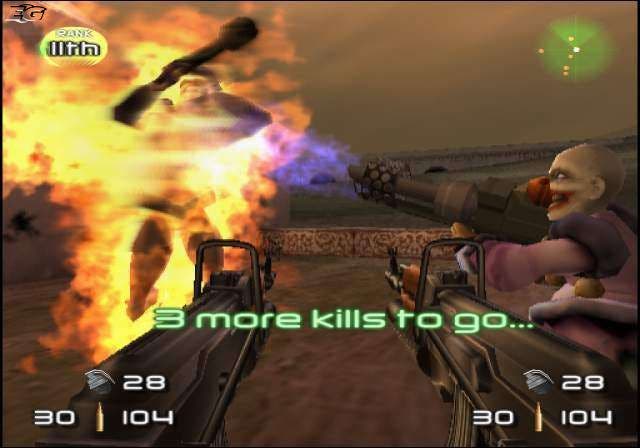What's next for Crytek UK?
"We'd love to do a new TimeSplitters."
In 2009, after slipping into administration following the failure of PS3-exclusive shooter Haze, Free Radical Design was bought by Crytek and renamed Crytek UK. The Nottingham studio then set upon work on the multiplayer portion of next year's Crysis 2.
Now, with that work almost finished, thoughts turn to the future. What's next for the studio, founded by some of the brains behind FPS classics GoldenEye and Perfect Dark, that made TimeSplitters - one of the highest-rated games on PS2 - and that nearly collapsed following the kicking Haze received from an aggressive press?
Here, in a sweeping interview with Eurogamer conducted at the recent GameCity festival in Nottingham, managing director Karl Hilton – who was the art director on GoldenEye – tells us. Read on for musings on that, GoldenEye (of course), Haze, and more.
I can't talk about anything specific yet. We've got a couple of really interesting projects coming up for the UK studio very much focusing on what we do: first-person shooter games with strong multiplayer elements.
We're still talking to publishers so I can't go into any specifics yet, but we've got IPs in-house that we'd like to work further on. There will be additional stuff for other projects as well. We like to think of ourselves as a centre of excellence for multiplayer, so we help out in any way we can within the Crytek group in terms of those sorts of things as well.
They've got a lot of studios in other countries. We have a strong R&D team in the UK, so we contribute towards the engine. The main development of the engine is done in Frankfurt, but we help out with a lot of elements where we have particular expertise, particularly on consoles and networking. We're helping CryENGINE to go where it needs to go in the future.
There are a lot of different elements you can use. CryENGINE is not just an engine for making FPS games. It can be used in MMORPG-style games. It can also be used in serious simulations in other industries. Crytek does license it out to some very serious users. Even the movie industry is looking at that kind of software these days for pre-production work.
Depends how you define a game. Multiplayer is quite a big commitment, but it's not as big as doing the full single-player and multiplayer together. We're of a size where we can certainly do an entire project, plus support other things on the side. It's a question of the scale and scope of the game.
We're still interested in doing future iterations on multiplayer games, whether it's Crysis or other ones. We're also interested in doing an entire project in the UK, and we can certainly support those kinds of projects.
For a studio as a whole, if you get more than two or three IPs going in a studio you start to get very big. Then it's probably the time you should be breaking out into new studios so each studio starts to develop its own character and personality and can focus on those projects it wants to do.
There's clearly value in the TimeSplitters IP. Yes, it's in the UK studio. Yes, we could develop the game.

We're talking to publishers at the moment about whether that's a viable route or not. There hasn't been a TimeSplitters game for quite a while. The question is, obviously TimeSplitters is a FPS with a strong multiplayer element, is that the way to go with another one, or should it go down a different route, or should we be developing a new IP altogether?
The great thing about Crytek is the company is strong enough that we can look at either reinvigorating an old IP, or develop an entirely new one. It's down to us talking to publishers about what their interest is and where they see it going. If they're keen for a TS game, then we'd be happy to do one. If they'd like us to develop something new then we'd do that.
Whether the TS is like the classic TS or whether the TS is a new imagined TS, that's the other thing to discuss with them.
It's really hard to say. Talking to publishers, everyone is aware of TimeSplitters. It's got a brand awareness that's really good. Its success in different markets was quite variable. So depending on who you talk to, they either look at it as a really successful product or as a product that was almost successful but could have done better.

